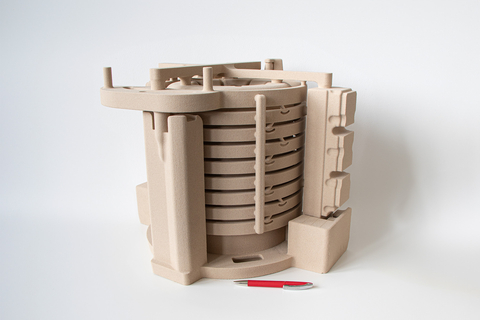Cold Inorganic Binding (IOB) 3D printing technology enables the production of moulds and cores for the foundry industry from sand and an inorganic binder without the need for microwave treatment.
In addition to a project called ICP (Industrialisation of Core Printing) undertaken with Loramendi for BMW, a new, patent-pending, cold-curing inorganic process technology (cold IOB) has been developed by voxeljet. The ICP project involves a fully automated, manufacturing cell in operation at BMW’s light metal foundry in Landshut. Within this manufacturing cell, casting cores are printed with inorganic binders and then cured using a microwave. Consequently, it is a warm process technology.
The new cold IOB technology does not require microwave curing and is thus characterised by lower investment and operating costs. The use of IOB technologies opens up numerous advantages for the foundry industry, e.g. only water vapour is produced during casting instead of harmful gases. This not only reduces emissions but also improves working conditions in foundries.
“The introduction of cold IOB technology is an important step towards further adoption of printed cores and moulds with inorganic binders in the foundry industry,” says Dr. Ingo Ederer, CEO at voxeljet. “Our goal is to provide innovative solutions that not only increase efficiency, but also help promote the sustainability of metal casting.”
The features of the cold IOB process technology and moulds and cores produced with it include high dimensional accuracy, very good detail resolution and edge sharpness, and the ability to 3D print large moulds and cores. Unlike warm IOB processes, which require printed cores to be cured and dried using a microwave, voxeljet’s cold IOB technology only requires drying after printing, which takes place outside the machine. Customers thus avoid high investment and operating costs for industrial microwaves. The process can basically be used on all voxeljet platforms. It is currently being tested and offered on the VX1000 and VX1000S printers. An expansion of the offering to the VX2000 is planned soon.
The use of inorganic binders in the foundry industry, especially in the automotive sector, is gaining popularity. In view of increasing environmental regulations, demand for inorganic-bonded moulds and cores is expected to rise continuously.
- UK manufacturing steps up to COVID-19 crisis - April 2, 2020
- Clustering Innovation - March 12, 2020
- A Global Monitor - March 6, 2020

